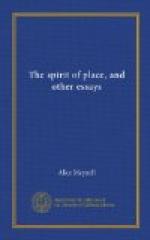“Fletrir,” again. Nothing could be more rhetorical than this perfectly common word of controversy. The comic dramatist is well aware of the spent violence of this phrase, with which every serious Frenchman will reply to opponents, especially in public matters. But not even the comic dramatist is aware of the last state of refuse commonplace that a word of this kind represents. Refuse rhetoric, by the way, rather than Emerson’s “fossil poetry,” would seem to be the right name for human language as some of the processes of the several recent centuries have left it.
The French comedy, then, is fairly stuffed with thin-S for an Englishman. They are not all, it is true, so finely comic as “Il s’est trompe de defunte.” In the report of that dull, incomparable sentence there is enough humour, and subtle enough, for both the maker and the reader; for the author who perceives the comedy as well as custom will permit, and for the reader who takes it with the freshness of a stranger. But if not so keen as this, the current word of French comedy is of the same quality of language. When of the fourteen couples to be married by the mayor, for instance, the deaf clerk has shuffled two, a looker-on pronounces: “Il s’est empetre dans les futurs.” But for a reader who has a full sense of the several languages that exist in English at the service of the several ways of human life, there is, from the mere terminology of official France, high or low—daily France—a gratuitous and uncovenanted smile to be had. With this the wit of the report of French literature has not little to do. Nor is it in itself, perhaps, reasonably comic, but the slightest irony of circumstance makes it so. A very little of the mockery of conditions brings out all the latent absurdity of the “sixieme et septieme arron-dissements,” in the twinkling of an eye. So is it with the mere “domicile;” with the aid of but a little of the burlesque of life, the suit at law to “reintegrer le domicile conjugal” becomes as grotesque as a phrase can make it. Even “a domicile” merely—the word of every shopman—is, in the unconscious mouths of the speakers, always awaiting the lightest touch of farce, if only an Englishman hears it; so is the advice of the police that you shall “circuler” in the street; so is the request, posted up, that you shall not, in the churches.
So are the serious and ordinary phrases, “maison nuptiale,” “maison mortuaire,” and the still more serious “repos dominical,” “oraison dominicale.” There is no majesty in such words. The unsuspicious gravity with which they are spoken broadcast is not to be wondered at, the language offering no relief of contrast; and what is much to the credit of the comic sensibility of literature is the fact that, through this general unconsciousness, the ridicule of a thousand authors of comedy perceives the fun, and singles out the familiar thing, and compels that most elaborate dulness to amuse us. Us, above all, by virtue of the custom of counterchange here set forth.




